Clarins and FEED have just announced the launch of this year’s National Million Meal Mission. This venture aims to provide 1,200,000 meals to children around the world in 17 days – starting on April 22nd, and ending on May 8th, 2016. Nine retailers across the country will be o ering a FEED 10 pouch lled with deluxe Clarins products. Each pouch provides 10 meals to children, helping them grow, learn and thrive – an investment in their futures.
For many children around the world, hunger is not only a daily struggle, it is life threatening. School meals offer hope. Clarins believes that beauty comes from the heart and is expressed by taking direct action to help those less fortunate. The company’s pioneering social policy has always supported health, environmental and educational initiatives in under-developed nations around the globe, which is in sync with FEED’s global philosophy – “Create Good Products That Help FEED The World.”
Since 2011, FEED and Clarins have provided over 10 million meals to children around the world. Through this year’s National Million Meal Mission, FEED and Clarins hope to make the world a better place for present and future generations, one meal at a time.
After witnessing the effects of hunger firsthand when traveling as a WFP Honorary Spokesperson, Lauren Bush Lauren founded FEED Projects in 2007 with the simple idea of creating products that would engage people in the fight against hunger. As a social business, FEED believes that everyone has the right to basic human necessities, such as healthy nutritious food. Their enduring principle lies at the heart of what they do: people’s choices of what to buy and wear have the power to change the world. As such, all of their products are produced under fair-labor conditions, and when sold, they each have a measurable donation attached to it. The company’s choice to work with the United Nations World Food Program school meal initiative was a way to benefit children not only though nutrition, but also through education. Research shows that when children are given school meals, attendance doubles and performance greatly improves. FEED’s personal commitment to working against hunger is matched with a commitment to the environment and to safe and healthy working conditions for everyone they work with. Eight years since its founding, FEED has built a movement connecting customers to the cause, one bag at a time.
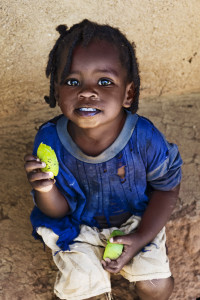
Three year old Esnas Savai is the daughter of Jane Ambasa, who is currently a beneficiary of the WFPÕs Mother and Child Health programme in Maseno. Jane, who prior to receiving food aid from the programme was weak and unable to produce enough milk to feed her newborn baby, now receives CSB blend porridge along with advice on how to cook and look after herself, Esnas and her two other children ages 9, and 2 months old.
Photo: WFP/Rein Skullerud
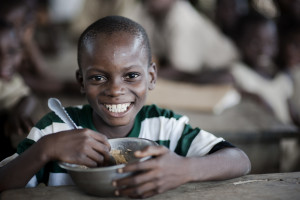
Mtohou Primary School
Present in Benin since 1964, the World Food Programme (WFP) is supporting the Government of Benin in achieving the Millennium Development Goals of Ending Poverty and Hunger, Universal Education and Gender Equality through its School Feeding Programme. Primary education is a priority for the Government, which is committed to providing universal primary education by 2015. Under the current operation, WFP is providing a daily hot meal to over 103,000 children in 364 schools in poor rural areas. The objective is to increase the enrollment and attendance rates in targeted districts, particularly for girls. The number of schools assisted will decrease over the course of the intervention, with a gradual handover of canteen management from WFP to the Government school feeding programme. Government capacity building for management of school canteens is a core aspect of the new projectÕs strategy and one of the fundamental objectives of the project. WFP will provide technical assistance to the Government of Benin in order to support the establishment and functioning of a national school feeding programme that will eventually be able to take over completely from WFP
In the photo:
Paulin Kedji is 8 years old, he has three brothers and two sisters. Every day he has to walk for almost 45 minutes to get to school, and like many other children he does not go back home during the break from 12 :00 to 3 :00 oÕclock, he prefers to stay around the school area and play with his friends. He is happy to be a beneficiary of the WFP school canteens because without this Programme he wouldnÕt have much to eat. He loves rice, and the best one is the one cooked by his mother. HeÕs not sure of what his favorite subject is, but he loves to play with his friends and his favorite sport, soccer. One day he dreams of becoming a famous soccer player, and why not the President of Benin!
Photo: WFP/Rein Skull
UNA BELLA COLABORACIÓN EVOLUCIONA
CLARINS y FEED están orgullosos de anunciar el lanzamiento de National Million Meal Mission. Esta nueva y emocionante iniciativa tiene como objetivo de proveer 1,200,000 comidas a niños alrededor del mundo en 17 días – empezando el 22 de Abril, y acabando el 8 de Mayo de 2016. Nueve distribuidores en los Estados Unidos ofrecerán un estuche FEED 10 lleno de productos deluxe de Clarins. Cada estuche permite ofrecer 10 comidas a niños, ayudándoles a aprender, crecer y a desarrollarse – una inversión en sus futuros.
Para muchos niños en el mundo, el hambre no solo es una lucha diaria, sino también una amenaza en sus vidas. Comidas ofrecidas en la escuela dan esperanza. Desde el 2011, FEED y Clarins han proveído más de 10 millones de comidas a niños alrededor del mundo. A través de National Million Meal Mission, FEED y Clarins esperan hacer del mundo un sitio mejor para generaciones presentes y futuras, comida a comida.
CLARINS
Clarins es conocido alrededor del mundo por ayudar a generaciones de mujeres a conseguir una belleza natural y autentica. El respeto se manifiesta en todos los ámbitos de actividad de Clarins: respeto del consumidor, de las plantas, del medio ambiente; respeto del ser humano. Clarins cree que la belleza nace en el corazón y se expresa mediante la adopción de medidas directas para ayudar a los más desfavorecidos. El compromiso social del grupo Clarins a favor de un modelo de Desarrollo Responsable se traduce en el apoyo que proporciona a asociaciones médicas, humanitarias y medioambientales en naciones subdesarrolladas alrededor del globo. El progreso es la base de la filosofía de Clarins, que siempre se ha comprometido a hacer la vida más bella – ocupándose del presente a la vez que considerando el bienestar de generaciones futuras. “Dejar un mundo mejor” es un lema que Clarins lleva a cabo en todo lo que hace.
FEED
Después de un viaje como embajadora del United Nations World Food Programme (WFP), Lauren Bush Lauren funda FEED Projects en 2007 con la simple idea de crear productos que tengan el poder de sensibilizar al público sobre el aumento del hambre en el mundo. Como empresa de carácter social, FEED cree que todo el mundo tiene derecho a necesidades humanas básicas, como una buena alimentación. Su principio se encuentra en todo lo que hacen: lo que cada persona elige comprar tiene el poder de cambiar el mundo. Es por esto que todos sus productos son elaborados bajo condiciones laborales justas, y obtienen una donación mesurable a la hora de su venta. La elección de la compañía de trabajar con el programa alimenticio administrado por las Naciones Unidas fue un gran beneficio para los niños no solo a través de la alimentación, sino también a través de la educación. Estudios recientes muestran que cuando se ofrecen comidas a alumnos en las escuelas, la asistencia al colegio aumenta el doble y el rendimiento mejora en gran medida. Teniendo como objetivo global “Crear buenos productos que ayuden a alimentar el mundo,” FEED ha establecido un movimiento conectando consumidores a la causa, estuche a estuche.
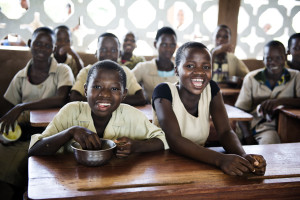
Mtohou Primary School
Present in Benin since 1964, the World Food Programme (WFP) is supporting the Government of Benin in achieving the Millennium Development Goals of Ending Poverty and Hunger, Universal Education and Gender Equality through its School Feeding Programme. Primary education is a priority for the Government, which is committed to providing universal primary education by 2015. Under the current operation, WFP is providing a daily hot meal to over 103,000 children in 364 schools in poor rural areas. The objective is to increase the enrollment and attendance rates in targeted districts, particularly for girls. The number of schools assisted will decrease over the course of the intervention, with a gradual handover of canteen management from WFP to the Government school feeding programme. Government capacity building for management of school canteens is a core aspect of the new projectÕs strategy and one of the fundamental objectives of the project. WFP will provide technical assistance to the Government of Benin in order to support the establishment and functioning of a national school feeding programme that will eventually be able to take over completely from WFP
In the photo:
Emile Meto is 12 years old; he has two brothers and four sisters. His father recently passed away and now the mother is in charge of supporting the entire family. She took over the family fields and is a farmer, providing her family with the food and selling whatever is left over.
Emile and his family live in a house made of cement blocks, which is very rare in Benin, although they have no furniture, and they sleep on the floor without even a mat or mosquito nets.
EmileÕs house is not very far from the school and he usually walks there with his brothers and sisters. Before going to school he helps his mother in the field, so he has to wake up very early. He enjoys reading and writing stories and one day he dream
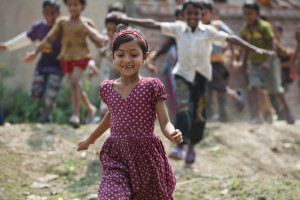
Jyoti Roy, 6, a student of class one, enjoying her free time, having fun with school friend in the ground nearby her school.
Photo: WFP/Shebab Uddin
Lauren Bush on feed:

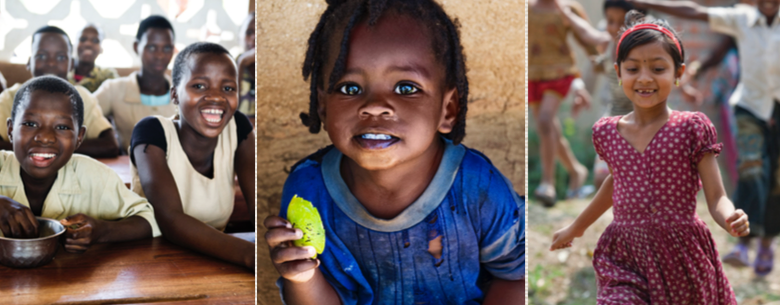

 Contact Us
Contact Us